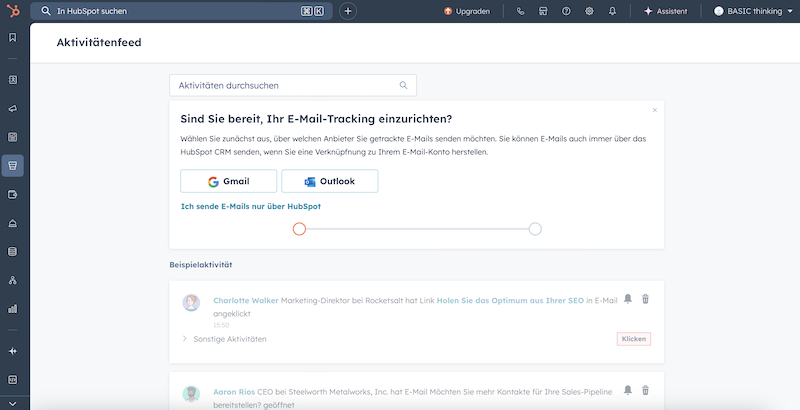The article CRM for manufacturing companies: How do manufacturing companies optimize their customer processes and order processing? first appeared in the online magazine BASIC thinking. With our newsletter UPDATE you can start the day well informed every morning.

Manufacturing companies must process customer inquiries quickly, create offers efficiently, process orders reliably and at the same time maintain an overview of ongoing projects. A CRM like the platform from HubSpot supports manufacturing companies in digitizing customer processes, improving collaboration between sales, production and service and making the entire order processing process more transparent.
Typical challenges in everyday production
In the day-to-day business of manufacturing companies, many processes run in parallel: Sales processes inquiries, production plans capacities, service looks after existing customers and management needs meaningful reports. Without a central solution, information gaps, duplication of work and delays quickly arise.
Common problems without CRM:
- Customer data and order information are distributed across different systems
- Offers and orders are tracked manually
- Communication gaps between sales, production and service
- Lack of transparency about project status, deadlines and workload
What a CRM has to do for manufacturing companies
Modern CRM software for manufacturing companies should offer the following functions:
- Central customer and order management: All customers, offers, orders and communication processes are clearly stored in one place.
- Efficient offer and project management: New inquiries are automatically recorded, offers are created and projects are created in the CRM.
- Automated tasks and deadlines: The system reminds you of important deadlines, follow-ups and required documents.
- Transparent communication: Sales, production and service access the same data and document all steps.
- Reporting and evaluation: Dashboards provide insights into order volume, project status and utilization.
- GDPR compliance: Data protection and the documentation of consent are particularly important for manufacturing companies.
Practical: This is how HubSpot supports manufacturing companies in their everyday lives
With the platform of HubSpot Manufacturing companies can manage their customer processes and order processing reproduced completely digitally. New inquiries are automatically added to the system, offers and projects are clearly laid out and all relevant information is stored centrally.
Example of a typical workflow:
- A customer makes a request via the website or via email.
- The CRM creates a new contact and a new project and assigns the request to sales.
- The system automatically creates an offer and reminds you of important deadlines.
- After the order is placed, all project data, documents and appointments are maintained in the CRM.
- The service team receives automated tasks for aftercare and maintenance.
Customer processes and order processing: Everything at a glance
The CRM software from HubSpot enables manufacturing companies to transparently manage all customer contacts and orders. Each customer receives their own profile with history, projects, documents and status. New leads are sorted according to relevance and tracked specifically. This means no inquiries are lost and order processing runs smoothly.
Advantages:
- Fast response times to customer inquiries
- Better tracking of orders and open cases
- Transparency for the entire team and management
- Less time and information wasted through central storage
Customer service and aftercare: Creating more value after the sale
In the manufacturing sector, the customer relationship does not end with the delivery of a product. Service requests, spare parts, maintenance and technical support are often crucial for long-term customer satisfaction and loyalty. With a CRM like HubSpot, manufacturing companies can control all service processes in a structured and transparent manner.
The platform makes it possible to create service tickets automatically and document the entire process from the request to the solution. Recurring maintenance appointments and spare parts orders are stored as tasks in the CRM and the system reminds the team in a timely manner of any measures that are due. Customers receive automated updates on their ticket status and can provide direct feedback, which in turn flows into quality improvement.
Through this seamless aftercare Manufacturing companies strengthen their customer loyalty, increase the recommendation rate and position themselves as reliable partners. Professional customer service, supported by digital workflows, ensures fewer failures, faster response times and more trust – real added value for companies and customers alike.
Typical workflows and automations for manufacturing companies with HubSpot
| Workflow/Automation | Benefit for the company |
|---|---|
| Lead capture and allocation | New inquiries are automatically recorded and assigned to the appropriate sales team |
| Offer management | Offers are created and tracked directly from the CRM |
| Project start and task planning | Automatic creation of projects, tasks and deadlines after the order is placed |
| Service and maintenance management | Automated tasks for aftercare and maintenance work |
| Reporting & Dashboards | All key figures for orders, projects and utilization at a glance |
Step-by-step: This is how manufacturing companies digitize their processes with HubSpot
- Account on the HubSpot-Create platform: Register the company and select the appropriate data protection region.
- Import data: Transfer existing customer, project and order data into the system via CSV import.
- Set up lead and order management: Create all customers, projects and contacts in the CRM and link them to the responsible teams.
- Enable automated workflows: Set up workflows for quotes, project start, service and maintenance.
- Configure dashboards and reports: Create overviews of order volume, project status and team utilization.
- GDPR and data protection ensure: Configure access rights and document consent for legally compliant processes.
HubSpot vs. SAP Sales Cloud for manufacturing companies
Many manufacturing companies in Germany rely on the SAP Sales Cloud, which integrates seamlessly into existing ones SAP ERP– and production systems can be integrated. SAP Sales Cloud scores with deep process integration, extensive functions for quotation creation, order management and individual adaptability – especially for larger companies with complex workflows.
HubSpot, on the other hand, impresses with a particularly user-friendly interface, quick implementation and strong automation functions in sales. The platform is ideal for medium-sized manufacturing companies that value central customer and order management, transparent communication and flexible workflows.

HubSpot can also be connected to ERP and production systems via interfaces, but is often cheaper and ready for use more quickly than SAP.
Reporting and key figures: making success measurable
With the platform’s analysis tools, manufacturing companies can keep an eye on all important key figures:
- Number and status of new customer inquiries
- Order volume and project status
- Team utilization and open tasks
- Customer satisfaction and feedback
- Service and maintenance rate
Integration with ERP and production systems
One of the greatest strengths of HubSpot as a CRM for manufacturing companies is the possibility of connecting the system with existing ERP and production solutions. Order data, production status and invoice information can be automatically synchronized via open interfaces and numerous integrations. Sales, production and accounting always work with current data – sources of error are minimized and collaboration between the departments runs smoothly.
With this connection, manufacturing companies can process orders faster, plan delivery dates better and inform customers about the status of their project at any time. The integration ensures more transparency, fewer queries and a better customer experience – a real competitive advantage in the modern manufacturing market.
FAQ: CRM for manufacturing companies – the most important questions
Is HubSpot suitable for small and large manufacturing companies?
Yes, the platform is scalable and adapts to any business model.
Can I connect HubSpot to ERP or production systems?
The solution offers numerous integrations to common systems in the manufacturing industry.
How does automation help in everyday life?
Workflows save time, prevent errors and ensure consistently high service quality.
How secure is my customer data?
HubSpot is GDPR compliant and offers European data centers for privacy-conscious companies.
How quickly can I start?
The setup usually only takes a few hours. The first automations and dashboards are quickly available.
Conclusion: CRM as the key to efficient customer processes and order processing
A CRM like the platform from HubSpot makes customer processes and order processing for manufacturing companies more modern, transparent and successful. With individual workflows, real-time reporting and seamless integration, companies not only win more orders – they also offer better service and stand out in the market.
Try HubSpot for free now and find out how easy digitalization can be in everyday manufacturing
The article CRM for manufacturing companies: How do manufacturing companies optimize their customer processes and order processing? first appeared on BASIC thinking. Follow us too Google News and Flipboard or subscribe to our newsletter UPDATE.
As a Tech Industry expert, I believe that implementing a Customer Relationship Management (CRM) system is essential for manufacturing companies looking to optimize their customer processes and order processing. A CRM system allows companies to centralize customer data, track interactions, and streamline communication with clients.
Manufacturing companies can use CRM to improve customer relationships by providing personalized service, understanding customer needs, and anticipating future demands. By analyzing customer data and trends, companies can better tailor their products and services to meet the needs of their clients.
In terms of order processing, CRM can help streamline the sales cycle, automate the order entry process, and track orders from start to finish. This can lead to improved order accuracy, faster order processing times, and increased customer satisfaction.
Overall, implementing a CRM system can help manufacturing companies optimize their customer processes and order processing by providing a centralized platform for managing customer relationships, improving communication, and increasing efficiency. By leveraging CRM technology, companies can better serve their customers, increase sales, and drive business growth.
Credits